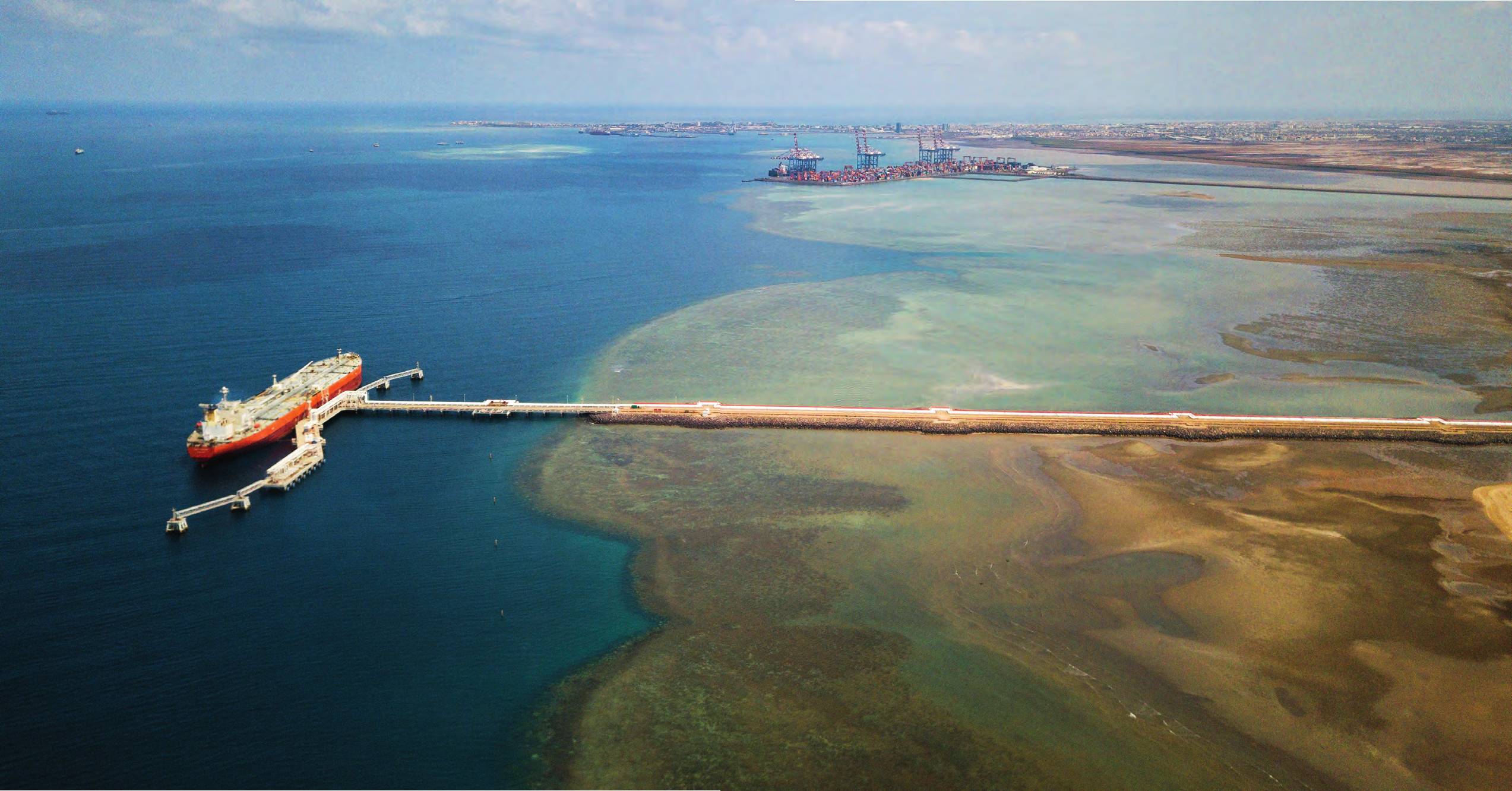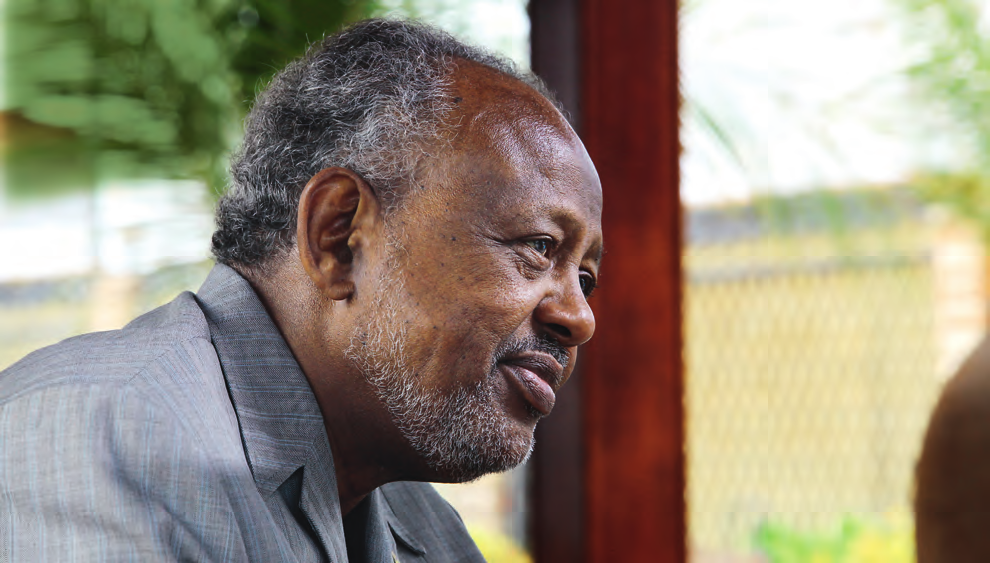Opening up to the world

Since President Ismaïl Omar Guelleh first took office in 1999, Djibouti has been on the road to emergence and relying on a unique geostrategic location. The implementation of Vision 2035 involves diversifying the economy to fuel long-term growth.
Coming to Djibouti is like traveling back in time. Here, on the eastern tip of Africa, facing the Red Sea across from the Arabian Peninsula, visitors astounded by the seismic faults, salt flats and inexhaustible seas feel as if they have stepped back into the origins of the world. The land of Djibouti is very old, but the country is one of the youngest on the planet. In June, the republic will celebrate the 45th anniversary of its independence. Despite a harsh, dry natural environment and a complex geopolitical context, in less than a half-century it has embarked on the road to emergence. Djibouti has an area of 23,200 km2, a population of about one million, less than 1,000 km2 of arable land (4.31% of the total area) and an average rainfall of 130 millimeters per year. Yet, in this particularly adverse context, it has carved out a place for itself on the global map. A city-state was born, and between the dry hills and the blue sea, a city open to the world has grown, boasting huge port cranes, new business districts, luxury hotels and banks working with the whole sub-region. Djibouti also has a strong strategic-diplomatic component, with Chinese, US, French and Japanese military bases as well as imposing embassies. First, the country had to overcome rifts and weaknesses left by the colonial legacy and the demarcation of borders. Throughout the 1990s, negotiations took place to end the civil war between the government and the Front pour la restauration de l’unité et la démocratie (Front for the Restoration of Unity and Democracy, FRUD) seeking to overthrow it. Under the leadership of Ismaïl Omar Guelleh (IOG), who was elected president in 1999, succeeding Hassan Gouled Aptidon, the peace agreement was signed in 2001, definitively ending the bloody conflict. Djibouti could then patiently rebuild by forging ties between the Afar, Issa, Yemeni and other communities. This fabric is fragile and subject to the impact of regional crises, but it is holding. People of different backgrounds are mingling more and the idea of a community of interests and a shared history is gaining ground. Nation-building is a real conquest. And nothing would have been possible without defining this new national pact.
In 2001, the “emergence” project shifted into high gear by relying on a unique geostrategic position at the entrance of the Bab el-Mandeb Strait on the corridor leading to the Suez Canal, a strategic maritime route and one of the world’s busiest sea lanes. Meanwhile, Djibouti became one of the region’s natural outlets, especially for economically-growing Ethiopia. Relying on its naturel and strategic assets, Djibouti built a world-class port and logistics platform in less than 20 years.
In 2008, the Doraleh container port opened in partnership with DP World. In 2016, the first trains of the new Djibouti-Addis Ababa rail line began rolling. In 2017, the Doraleh Multipurpose Port (DMP) and the Port of Tadjourah began operating. In 2018, the first section of Africa’s largest free zone, the 4,800-hectare, $3.8 billion Djibouti International Free Trade Zone, opened. Over the years, Djibouti has become a hub between Asia, Africa and Europe. The country has far surpassed its original goal of being only a storage or importation zone. Now the plan reaches much further: intercontinental transit, re-exportation, related activities such as bunkering and ship repair, industries involving port activities and the free zone. This eventually caused a break with DP World, the Dubai giant more concerned about its own interests and protecting those of Jebel Ali, its home port.
Like every country in the world, the Covid-19 pandemic has hit Djibouti hard, but the impact was better absorbed than feared. Growth was slightly positive in 2020 and should remain so in 2021 and 2022. Vision 2035, the long-term strategy promoted by President Ismaïl Omar Guelleh and his government, should support growth and investments. One prominent example is the development of the Damerjog complex, the spearhead of Djibouti’s industrialization. The 15-year project includes building petrochemical plants to meet the needs of the entire sub-region. Gas, metallurgical industries and shipyards will be next.
Lastly, Djibouti is a key part of China’s enormous New Silk Road plan, in which Beijing has invested $15 billion since 2012. The gigantic China Merchants Group has acquired a minority stake in the Port of Djibouti holding company and is deeply involved in the full-scale redevelopment of the former Port of Djibouti City and the development of an adjoining business district. This spectacular logistics and port complex stretching out between Doraleh and the city should give Djibouti a sustainable lead over potential competitors in the sub-region.
REAL PROGRESS
There are real opportunities beyond ports. The ongoing privatization of Djibouti Télécom will boost digital activity and services by relying on eight international underwater cables that terminate in the city. A stable, freely convertible currency should help Djibouti City become the sub-region’s marketplace. Renewable energy could also fuel growth: the country has a high potential for generating geothermal, solar and wind power.

With spectacular scuba diving, salt lakes and desert golf courses, Djibouti also has a high tourism potential. Economic performance in the last 20 years, local and foreign investment and the building of world-class port and logistical infrastructure have helped boost GDP sixfold and per-capita income fivefold. A middle class has emerged and is getting stronger. Efforts are also stepping up in the areas of water, power (60% of the population is on the grid) and education. In 1999, Djibouti did not have a university. Today, it has 10,000 students. Progress is real, but there is still a long way to go. Djibouti’s demographics and youth are putting pressure on the economy and society. The fight against poverty and efforts to more actively include the regions in development are national priorities. The poverty rate, especially outside the capital, is still too high and about 45% of the working-age population is more or less directly unemployed. Djibouti always has to invest more, create more national wealth, increase investment margins in the social sector, promote local added value and develop a national private sector vibrant enough to fuel growth and generate jobs and opportunities and invest in the social sector.
A SMART BALANCE
Many people will say that as a trade-off for the fast, complex process of emergence, Djibouti has put itself under China’s thumb, run up uncontrollable debt and caved in to pressure from great powers such as the United States and France. However, the country has kept its margins of maneuver by striking a smart balance between all its partners and lenders, leveraging its strategic role in the Bab el-Mandeb Strait, making international trade more secure and fulfilling its humanitarian duties and obligations. Djibouti is crucial for regional stability and its global diplomacy is necessary for the country’s survival. Due to its strategic choices and the small size of its domestic market, its economy is particularly outward-looking and vulnerable to the ups and downs of the international conjuncture and geopolitical turmoil. The simmering civil war in Ethiopia, a huge country of 110 million people, poses a greater challenge to Djibouti than Covid, shifts in global trade patterns and domestic macroeconomic reforms. Djibouti needs a united, stable and peaceful Ethiopia and a safe, open corridor between the port and Addis Ababa. The crisis has had a direct impact on trade and growth—and risks spreading to neighboring countries. It is a test of Djibouti’s resilience, national cohesion and strategic adaptability. For President Guelleh, the country must persevere, act, ensure security and plan for the future. That is the meaning of the country’s economic diversification, creation of new industries and increasingly determined opening up to the world.